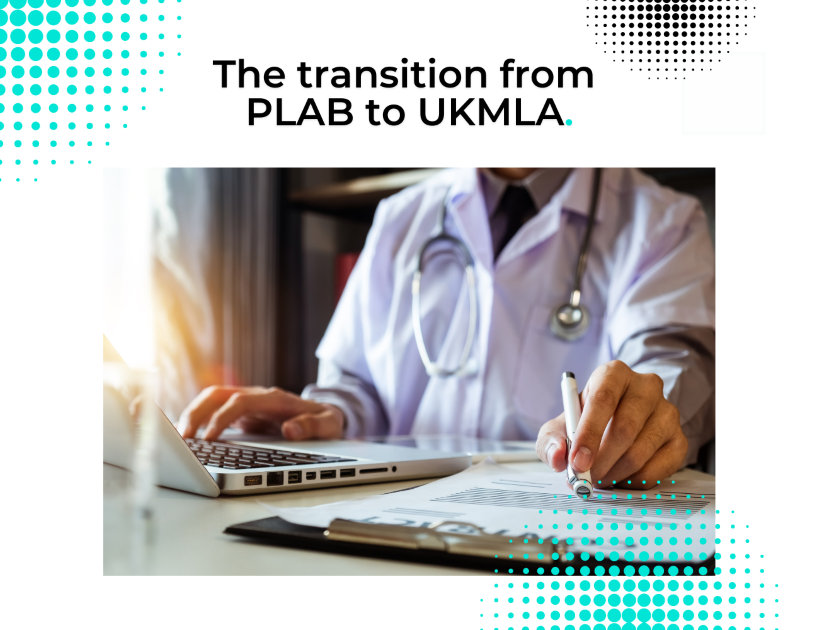
The Transition from PLAB to UKMLA
The GMC are introducing The UKMLA or MLA (Medical Licencing Assessment) in a move that will significantly strengthen medical licensing standards. Replacing the existing PLAB (Professional and Linguistics Assessment Board) in 2024, the UKMLA will become the new standard test of the core knowledge, skills and behaviours for all doctors practicing in the UK – this will apply to both UK medical students and international medical graduates (IMGs).
To help, we’ve taken a look at the assessment and some key questions that should help give you all the information you need.
Why is the MLA being introduced?
Currently, there is no standard used for both UK medical graduates and international doctors.
IMGs need to complete both parts of PLAB before they are eligible for full GMC registration, while UK students can gain full registration upon moving to the second year of the Foundation Programme in an approved training programme.
The MLA will therefore set a common threshold for safe practice in the UK, regardless of where a doctor trained.
When do I need to take the MLA?
For UK medical students set to graduate from the academic year 2024-25 onwards, they’ll be required to pass the MLA as part of their degree before they can gain full registration. Regarding international doctors who want to practice in the UK and who currently take PLAB, they will need to complete the MLA from starting 2024.
How do I transition from PLAB to MLA? Until 2024, IMGs will still be able to apply for PLAB, however, since overseas doctors wanting to come to the UK via this route will be at different stages of the process, the GMC has laid out the following guidelines to be in place during the transition to the UKMLA:
Passed both parts of PLAB – there will be no change. You still have two years from the date you passed PLAB to apply for full GMC registration.
Passed PLAB 1 but haven’t started PLAB 2 – Provided you’ve passed PLAB 1 within two years, you won’t need to take the AKT. Instead of PLAB 2 you’ll be required to take the CPSA. Once you pass the CPSA, you are eligible to apply for full registration provided it’s within two years of passing.
Attempted PLAB 1 but didn’t pass – You will need to sit the AKT. Note, there will be a maximum number of attempts and any previous attempts to pass PLAB 1 will count towards this. After passing the AKT, you will be required to take the CPSA within two years.
Passed PLAB 1 and attempted PLAB 2 but didn’t pass – Provided you passed PLAB 1 within the past two years, you won’t need to sit the AKT. You will be required to take the CPSA instead of PLAB 2. Note, there will be a maximum number of attempts and any previous attempts to pass PLAB 2 will count towards this. Once you pass the CPSA, you are eligible to apply for full registration provided it’s within two years of passing.
What’s the format of the MLA?
The MLA is a two-part test. The Applied Knowledge Test (AKT) – Written assessment of clinical knowledge Clinical Professional Skills Assessment (CPSA) – Performance-based assessment of clinical and professional skills, knowledge and behaviours.
Note, there will be differences in both the AKT and the CPSA for UK medical graduates and IMGs.
What will be assessed in the MLA? All content in the MLA will derive from the MLA content map and will follow three themes: Readiness for safe practice Managing uncertainty Delivering person-centred care
The MLA will also cover the following ‘domains’:
Areas of clinical practice, such as mental health and surgery.
Areas of professional knowledge, such as biomedical sciences and medical ethics and law.
Clinical and professional capabilities, such as assessing and managing risk and safeguarding vulnerable patients.
Practical skills and procedures, as set out in the list of practical skills and procedures that supplements the GMC Outcomes for graduates.
Patient presentations, which relates to signs, symptoms, investigation results and other relevant patient-related issues typically seen by doctors in a first appointment within the UK Foundation Programme.
Conditions, which are pathophysiological diseases or clinical diagnoses typically seen by doctors in a first appointment within the UK Foundation Programme.
What are the benefits of UKMLA?
The MLA offers several advantages to aspiring doctors:
Global recognition: The MLA aligns with international standards, enhancing the portability of qualifications and enabling doctors to practice in different countries more seamlessly.
Enhanced competence assessment: The comprehensive nature of the MLA allows individuals to demonstrate their clinical expertise, communication skills, and professionalism, showcasing their abilities more comprehensively to prospective employers.
Better preparedness: The MLA’s integrated approach encourages a more holistic approach to medical education, fostering well-rounded doctors who are equipped to face the complexities of modern healthcare.
What are the costs involved? The fees are yet to be decided by the GMC, however similar to PLAB, you will have to pay a fee to sit the UKMLA as an IMG
Are there any English language requirements? There will be no changes to the GMC’s English language requirements for registration - you will still need to prove that you have the knowledge of the English language required to safely practice in the UK.
If you have any questions about the upcoming changes, please feel free to get in touch with our expert team who will be more than happy to help you.
Speak to them on +44 (0)203 854 9060 or by emailing info@kaizenrecruitment.co.uk



